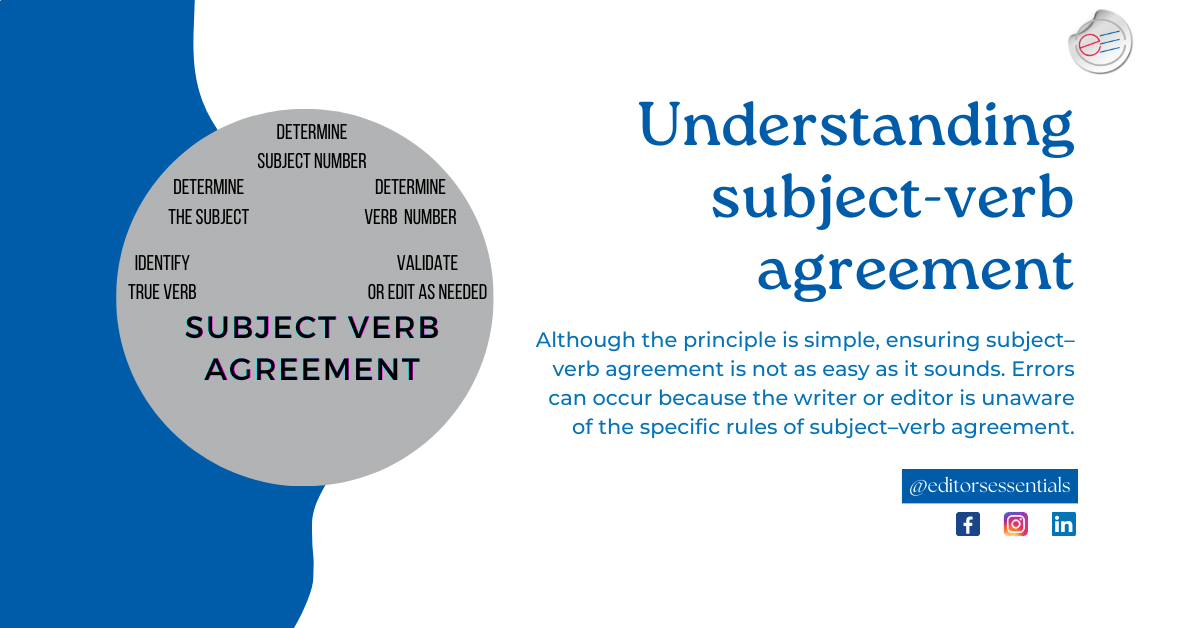Subject–verb agreement is a grammatical rule that states that the subject of a sentence must agree in number with the verb it governs. The principle behind this grammar concept is simple: if the subject of a sentence is singular or uncountable, the verb must be singular; if the subject is plural, the verb must be plural. Here is a 4-step approach to ensuring that a subject and its verb agree in number.
- Identify the verb.
- Identify the subject.
- Determine the subject’s number.
- Match the subject’s number with that of the verb.
But wait. Ensuring subject–verb agreement is not as easy as it sounds. Errors in agreement can occur simply because the writer or editor is unaware of the specific rules of subject–verb agreement. Even for those who know the rule, mistakes can happen due to typos, oversight, or rushing through the editing process.
Identifying the subject of a clause itself is often tricky. Read about it here!
Most importantly, errors in subject–verb agreement can occur for several reasons in cases beyond the straightforward ones. Here are some common factors that could complicate subject–verb agreement:
Compound subjects: When two or more nouns or pronouns are joined by a conjunction, the resulting subject may be singular or plural.
Example: “The Indian prime minister and his Palestinian counterpart hold discussions in light of the ongoing Israel–Hamas war,” but “Neither the Israel–Hamas war nor the Russia–Ukraine war seems to end soon.” Some people started worrying that the world is heading towards a third world war; let’s hope not.
Distance between the subject and its verb: When a sentence is long or convoluted, there might be a significant distance between the subject and its corresponding verb, separated by clauses and/or phrases. Often, you will be misled by a noun closer to the verb while determining the subject’s number, leading to errors. It can be challenging to correctly match the subject and verb in complex sentences with multiple clauses. This is especially true with relative clauses.
Example: “New Zealand, along with India and South Africa, sits prettily in the top three and seems to have reserved itself a semifinal berth,” but “Pakistan and England are a total shock in this edition.” The fourth spot is still open, but there is a lot of competition.
Indefinite pronouns: Indefinite pronouns can be tricky because some are singular, some are plural, and some can be both, depending on context.
Example: “All of the world loves peace,” but “All of the soldiers have returned home safely.” What a wonderful world we would be living in!
Collective nouns: Similar to some indefinite pronouns, collective nouns, which refer to groups of people or things, can be treated as singular or plural depending on whether the emphasis is on the group as a whole or on its members.
Example: “Team India have plans for a great celebration after they win the World Cup.” Or you may say, “Team India has plans for a great celebration after it wins the World Cup.” Chances are looking bright – a déjà vu in the making?
Special cases and exceptions: Some nouns have unique properties that may not follow the standard subject–verb agreement rules. For instance, words like “news” and “politics.” This is also true for words that refer to disciplines, such as “statistics” and “dynamics.”
Example: “Statistics is the study of numbers,” but “The statistics do not conclusively support a 70-hour work week.” Working ten hours a day is too much, you might think, but some people believe it is inadequate!
By learning the rules and practising regularly, you’ll develop a strong grasp of subject–verb agreement and greatly enhance your ability to edit and write clear, grammatically correct content.
Editor’s Essentials has recently launched its bite-sized courses. One of them is a course on subject–verb agreement. The first two lessons explain the basics (such as identifying the subject) and rules and exceptions. And the third lesson provides editing assignments. You may find more details here.





0 Comments